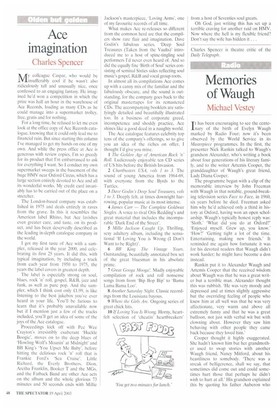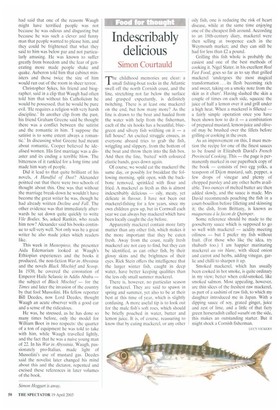Memories of Waugh
Michael Vestey
It has been encouraging to see the centenary of the birth of Evelyn Waugh marked by Radio Four; now it's been observed by the World Service in its Masterpiece programmes. In the first, the presenter Nick Rankin talked to Waugh's grandson Alexander, who's writing a book about four generations of his literary family, and to the writer Artemis Cooper, the granddaughter of Waugh's great friend, Lady Diana Cooper.
The programme began with a clip of the memorable interview by John Freeman with Waugh in that notable, ground-breaking television series Face to Face, in 1960, six years before he died. Freeman asked him why he'd achieved only a third in history at Oxford, having won an open scholarship. Waugh's typically honest reply was: 'Sloth.' What did you do at Oxford?' 'Enjoyed myself. Grew up, you know.' 'How?' 'Getting tight a lot of the time. Entertaining, making new friends.' It reminded me again how fortunate it was for his devoted readers that Waugh didn't work harder; he might have become a don instead.
Rankin put it to Alexander Waugh and Artemis Cooper that the received wisdom about Waugh was that he was a great writer but a terrible man. Alexander thought this was rubbish. 'He was very moody and depressed and at times slightly aggressive but the overriding feeling of people who knew him at all well was that he was very affectionate, very warm and above all extremely funny and that he was a great buffoon, not just with verbal wit but with clowning about. However they saw him behaving with other people they came back because they loved him.'
Cooper thought it highly exaggerated. She hadn't known him but her grandmother used to swap stories with another Waugh friend, Nancy Mitford, about his beastliness to somebody. 'There was a streak of belligerence, shall we say, that sometimes did come out and could sometimes hurt those that perhaps he didn't wish to hurt at all.' His grandson explained this by quoting his father Auberon who had said that one of the reasons Waugh might have terrified people was not because he was odious and disgusting but because he was such a clever and funny man that people wanted to please him, and they could be frightened that what they said to him was below par and not particularly amusing. He was known to suffer greatly from boredom and the fear of generating more made people shake and quake. Auberon told him that cabinet ministers and those twice the size of him would run out of the room in sheer terror.
Christopher Sykes, his friend and biographer, said in a clip that Waugh had often told him that without his Catholicism he would be possessed, that he would be pure evil. 'He requires a religion with very harsh discipline.' In another clip from the past, his friend Graham Greene said he thought there was a conflict between the satirist and the romantic in him. 'I suppose the satirist is to some extent always a romantic.' In discussing what Greene had meant about romantic, Cooper believed he idealised women. His first marriage was a disaster and its ending a terrible blow. The bitterness of it rankled for a long time and made him wary of people.
Did it lead to that quite brilliant of his novels, A Handful of Dust? Alexander pointed out that there were two schools of thought about this One was that without the marriage break-down he wouldn't have become the great writer he was, though he had already written Decline and Fall. The other evidence was that immediately afterwards he sat down quite quickly to write Vile Bodies. So, asked Rankin, who reads him now? Alexander said his books continue to sell very well. Not only was he a great writer he also made jokes which readers like.
This week in Masterpiece, the presenter Aida Edemariam looked at Waugh's Ethiopian experiences and the books it produced, the non-fiction War in Abyssinia and the novels Black Mischief and Scoop. In 1930, he covered the coronation of Emperor Haile Selassie in Addis Ababa — the subject of Black Mischief — for the Times and later the invasion of the country by that fool Mussolini. His fellow reporter Bill Deedes, now Lord Deedes, thought Waugh an acute observer with a good ear and a sense of the ridiculous.
He was, he stressed, as he has done so many times before, only the model for William Boot in two respects: the quarter of a ton of equipment he was told to take with him, while Waugh travelled lightly, and the fact that he was a naive young man of 22. In his War in Abyssinia. Waugh, passionately pro-Italian, made light of Mussolini's use of mustard gas. Deedcs said the novelist later changed his mind about this and the dictator, repented and excised these references in later volumes of the book.



































































 Previous page
Previous page